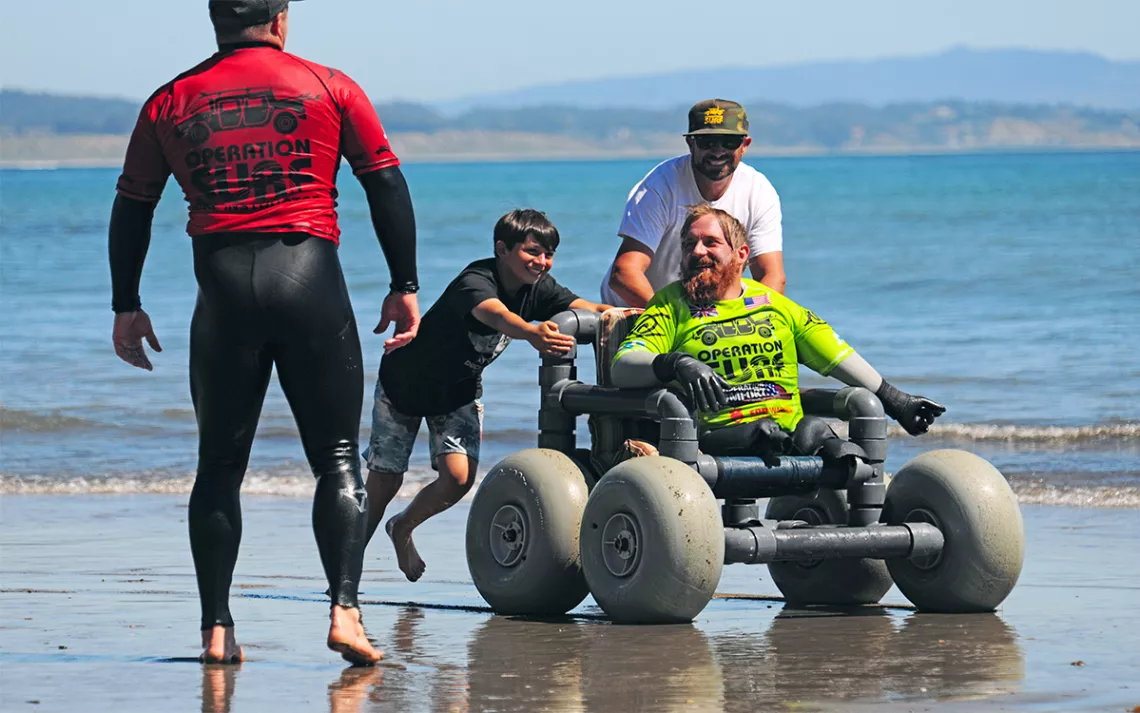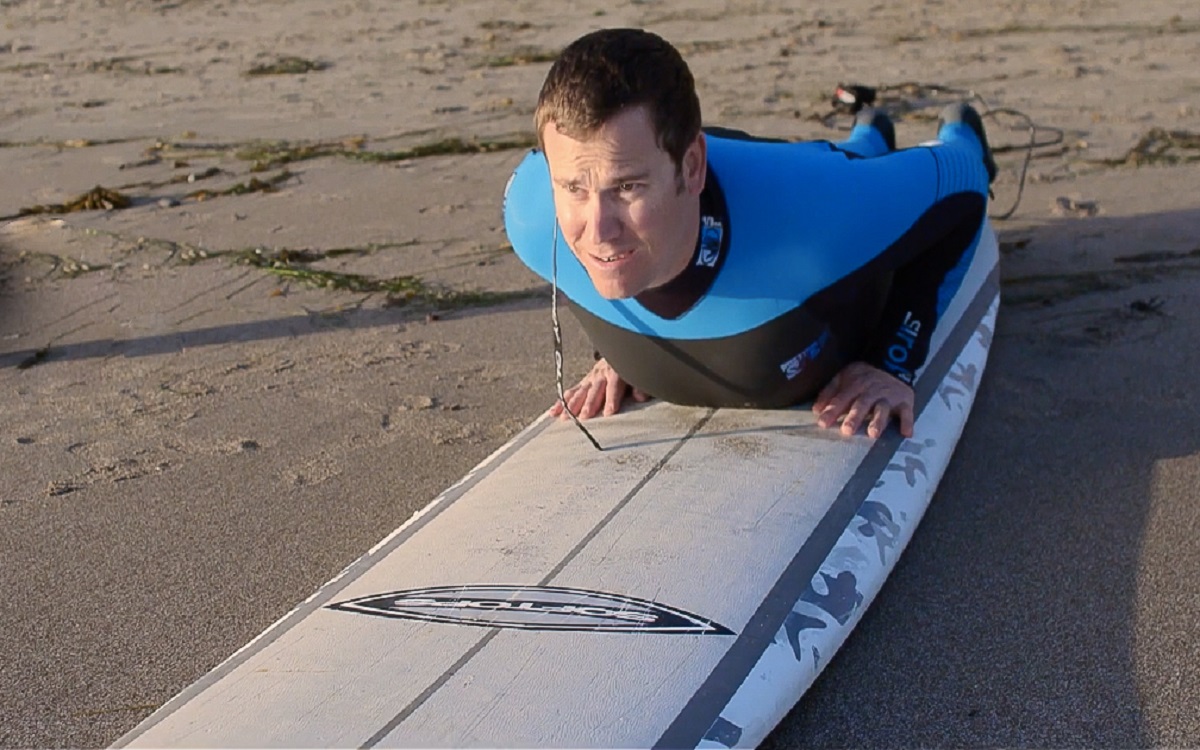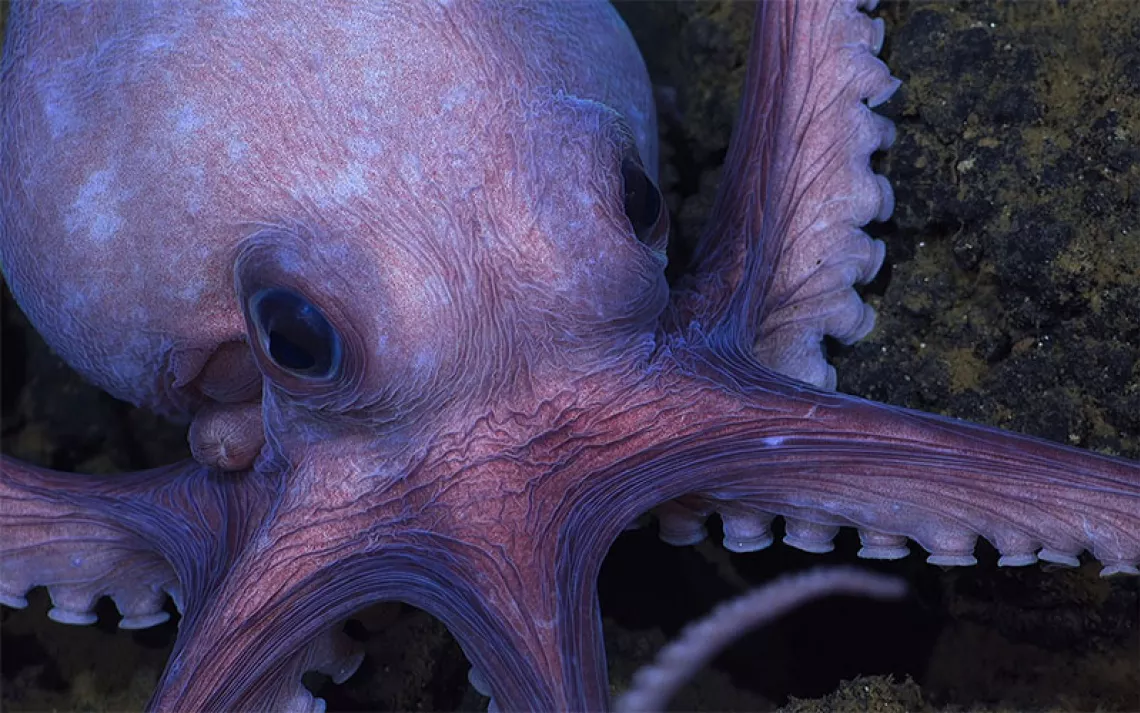Can the Ocean Help Heal Veterans?
The Netflix documentary “Resurface” explores ocean therapy for wounded soldiers

Steven L. Shepard | Photo courtesy of Amazing Surf Adventures
Marine Corps veteran Bobby Lane experienced the first symptoms of traumatic brain injury while he was still on active duty in Iraq. He was manning an artillery piece when he suddenly lost track of where he was and what he was doing. “I knew I was broke then,” he says.
His symptoms followed him home, where they often made everyday life feel unbearable. He considered suicide. At a certain point he resolved to follow through with it—but first he wanted to check one last item off his bucket list. “The plan was I was gonna go surfing, go home, make sure everything was in order, and then I was gonna get my gun and commit suicide,” he recounts.
He had never surfed before, but he had plans to attend a week-long event in Central California organized by Operation Surf, a group dedicated to teaching military veterans the sport. That week saved his life. Resurface, a stirring short documentary released on Netflix in September, tells Bobby’s story alongside accounts from other veterans who participated in the program. It explores the question How can surfing change the lives of military veterans?

Bobby Lane | Courtesy of Resurface
Operation Surf began nine years ago when a group of wounded veterans approached San Luis Obispo–based surf instructor Van Curaza with a desire to learn. Curaza had a passion for making surfing more accessible to underprivileged youth, and believed firmly in the power of what he calls “ocean therapy.” It wasn’t until that lesson, however, that he realized what the sport could do for military veterans. “I met these guys who were 19 and 20 with limbs blown off, and I was just completely blown away. Hearing their stories, I thought, ‘These guys deserve to have some peace and have some fun,’” Curaza said in an interview with Sierra. Today, Operation Surf holds multiple week-long surfing programs for veterans each year in locations throughout the coastal United States.
Some veterans who attend Operation Surf have suffered debilitating physical injuries in combat. Multiple surfers featured in the documentary learn to ride waves despite missing limbs. Many, like Lane, live with less tangible conditions like PTSD, brain injury, and depression. Lane recalls coming to after bouts of anger surrounded by broken furniture he didn’t remember smashing. And he isn’t the only subject in the film to recount a near-suicide—one surfer who suffers from PTSD describes holding a loaded gun in his mouth for minutes before deciding not to pull the trigger. Curaza said the veterans he meets through Operation Surf have “different paths, but similar challenges,” and directors Josh Izenberg and Wynn Padula do an admirable job of highlighting those in just 22 minutes of runtime.
Izenberg and Padula avoid the trap of portraying their subjects as hopeless characters fated to become statistics—instead, we meet them as they catch the first waves of their lives. For many of the veterans, those first rides prove to be transformative. “When I caught that wave, the part of Bobby that was going through so much pain and guilt . . . that part of me died that day,” Lane says.
The film portrays surfing as a sort of alternative medicine for wounded veterans—a source of peace, joy, and purpose that heals in ways traditional healthcare can’t. In one memorable scene, Lane wryly itemizes his prescription treatment plan for PTSD and traumatic brain injury symptoms. “I’m supposed to take this one for migraines, but I have to take this one with it to counteract it,” he explains in front of a medicine cabinet stocked like a kitchen pantry. You get the feeling that sometimes the pharmaceutical cocktails feel to him more like a burden than a solution. Later in the film, triple amputee surfer Martin Pollock describes foregoing a titanium implant surgery when he learned it would interfere with his ability to pop up on his board. “Surfing’s more important than walking I guess,” he says.
When Curaza started taking veterans surfing in 2008, there wasn’t much formal dialogue surrounding surfing as an outlet for trauma survivors. Today, Operation Surf is among a handful of organizations with a similar mission, and a number of PTSD and brain trauma experts have studied the science behind “ocean therapy.” Resurface features testimonials from some of these experts. “With PTSD, the brain’s chemistry actually changes by having thoughts over and over again. Surfing gives an out to create new pathways,” says psychologist Russell Crawford.
In the film, Lane recalls the night following his first day with Operation Surf. “I closed my eyes to go to sleep and the only thing I could dream about was catching that next wave."
 The Magazine of The Sierra Club
The Magazine of The Sierra Club



